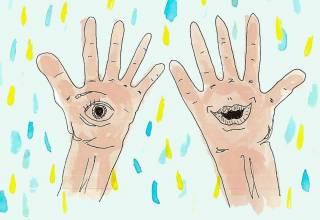“Reflexivity of reflexivity” with Roma-related Nordic educational research
Ioana Țîștea

“We need an interlude skit for our album. Can we record you while you talk in Romanian sensually? It does not matter what you say, nobody will understand. We will not mention your name. You smell so good, like a trip to India.” Musician from Oulu, Finland
“When you are around them, you also look ethnic.” White Finnish activist while visiting a reception centre for asylum seekers in Tampere, Finland
“Are there more shades of whiteness? Second generation Eastern Europeans will become integrated within western whiteness anyway.” Participant at an antiracist event in Helsinki, Finland
“Are you both Romanian? You must be the gypsy and your [blonde] friend must be the Romanian one.” Male person offering my friend and I drinks in a bar in Lisbon, Portugal
I live in the Nordic region, where I migrated from Eastern Europe. In the place where I come from, I am most often read in hegemonic nationalistic terms as ‘white Romanian’, though being identified through gendered readings and at times having certain bodily aspects racialised that may not fit within imagined norms. In diasporic contexts, I often pass as ‘white’, though being identified through “migratising”[1] and gendered readings. At times, I am identified through gendered and racialising readings as ‘woman of colour’, potentially as Roma. As the quotes above exemplify, when I am read as woman of colour, I am exoticised; when I am read as Eastern European, I am invisibilised. The invisibilisation of my socialist history can sometimes work as a privilege in a capitalist system built on whiteness. Whiteness can be defined as a socially constructed category sustaining power structures that reproduce and normalise white supremacy. It is not just about skin colour but also about inhabiting a position of privilege, which becomes invisible for those who inhabit it. However, passing is not equivalent with becoming. I do not become a woman of colour, but momentarily get read as western Europe’s ‘incomplete other’. I do not become white enough, but embody western Europe’s ‘incomplete self’. This raises questions about appropriation, solidarity, and abjectification of/with an ‘other’. What would dis-abjectification entail? As Alyosxa Tudor argues:
This process of dis-abjectification it not a single voluntary act, but a fragile effect of collective politics, empowering positionings and transient political alliances. […] making thinkable unthinkable and unnameable positionings; it is about the processes of making accounts of oppositional subjectivity possible and liveable.[2]
What is it that I am doing when I (do not) speak of the Roma? Do I perform an imagined Roma identity in diasporic interactions – such as academic contexts – given my misreadings as Roma? Do I enact such a performance as resistance against assimilation within a white Finnish narrative? Do I also engage in distancing myself from an imagined Roma identity? In other words, through my performative identity shifting, am I complicit in constructing the Roma as the abjects of migration and racism?
With these questions in mind, I wrote the first (open access) article comprising my PhD thesis[3]. In the article, I reflect on the various uses of reflexivity in Roma-related educational research focusing on the Nordic context, in my own and other authors’ writings. I respond to the call of the recently founded Critical Romani Studies journal for reflexivity, which has been raised since mostly non-Romani scholars produce Roma-related research. The journal seeks to challenge homogenising tendencies of mainstream Romani studies with new avenues that de-essentialise how knowledge is produced[4]. I purposefully selected 34 academic texts, which I closely read in relation to various research paradigms and their typologies of reflexivity, after which I further reflected on my own readings. My aim was to show the usefulness of reflecting on uses of reflexivity, or of a reflexivity of reflexivity, as a strategy to address the reproduction of epistemic privileges in research. By documenting research inconsistencies, which inevitably occur, researchers may reassess their positioning in colonial hierarchies of the knowledge economy and contribute to an ongoing, incomplete departure from colonising research, with no predictable destination.
[1] Researcher Alyosxa Tudor makes a critical differentiation between racialisation and what Alyosxa calls migratisation – the construction of migrants or the ascription of migration to certain bodies, which may or may not be racist. Tudor, A. (2018). Cross-fadings of racialisation and migratisation: the postcolonial turn in Western European gender and migration studies, Gender, Place & Culture. https://doi.org/10.1080/0966369X.2018.1441141
[2] Tudor, A (2017). Queering Migration Discourse. Differentiating Racism and Migratism in Postcolonial Europe. ambda nordica 2(3). https://eprints.soas.ac.uk/24717/
[3] Țîștea, I. (2020). “Reflexivity of reflexivity” with Roma-related Nordic educational research. Nordic Journal of Comparative and International Education (NJCIE), 4(1), 26-42. https://doi.org/10.7577/njcie.3579
